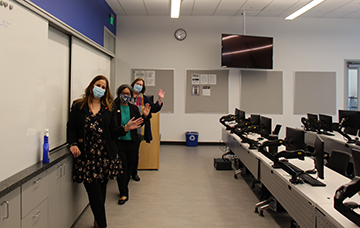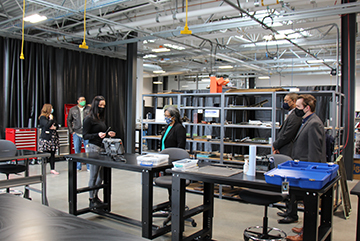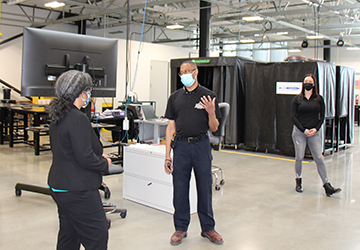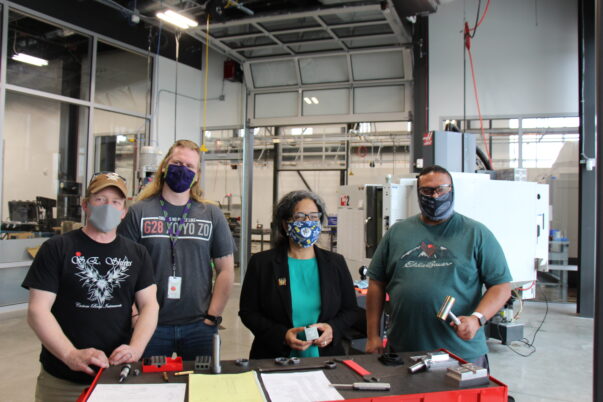Congresswoman Marilyn Strickland Visits CPTC Center for Advanced Manufacturing
 On April 7, Congresswoman Marilyn Strickland, who represents Washington’s 10th district in the United States House of Representatives, took a tour of Clover Park Technical College’s Center for Advanced Manufacturing, learning about the four programs housed in the Center and how they’re connecting Pierce County students to in-demand, high-wage jobs. The John W. Walstrum Center for Advanced Manufacturing was constructed in 2019 to house the College’s advanced manufacturing-related programs in a state-of-the-art facility uniquely equipped to support collaboration between the programs.
On April 7, Congresswoman Marilyn Strickland, who represents Washington’s 10th district in the United States House of Representatives, took a tour of Clover Park Technical College’s Center for Advanced Manufacturing, learning about the four programs housed in the Center and how they’re connecting Pierce County students to in-demand, high-wage jobs. The John W. Walstrum Center for Advanced Manufacturing was constructed in 2019 to house the College’s advanced manufacturing-related programs in a state-of-the-art facility uniquely equipped to support collaboration between the programs.
 The tour started in the Fundamental Skills for Manufacturing (FSME) classroom, where all students begin before branching out into Non-Destructive Testing, Advanced Manufacturing, or Mechatronics. As part of the statewide Guided Pathways initiative, CPTC has transformed FSME into an exploratory first quarter which prepares them to enter the workforce or continue for degrees in those fields. “I have students from all walks of life,” instructor Thomas Chesnes explained, adding many students come from the military (active duty and retired) or are retraining after a previous career.
The tour started in the Fundamental Skills for Manufacturing (FSME) classroom, where all students begin before branching out into Non-Destructive Testing, Advanced Manufacturing, or Mechatronics. As part of the statewide Guided Pathways initiative, CPTC has transformed FSME into an exploratory first quarter which prepares them to enter the workforce or continue for degrees in those fields. “I have students from all walks of life,” instructor Thomas Chesnes explained, adding many students come from the military (active duty and retired) or are retraining after a previous career.
 Non-Destructive Testing faculty Megan Davey and Douglas Evans demonstrated different testing methods, including ultrasound and x-ray. Congresswoman Strickland asked about job opportunities for graduates after completing the program, and Davies noted the program has a high job placement rate of 83%, reflecting how in-demand these skills are. Students begin their learning at CPTC with a degree, land a high-wage job, and continue to earn certifications with additional hours in the field.
Non-Destructive Testing faculty Megan Davey and Douglas Evans demonstrated different testing methods, including ultrasound and x-ray. Congresswoman Strickland asked about job opportunities for graduates after completing the program, and Davies noted the program has a high job placement rate of 83%, reflecting how in-demand these skills are. Students begin their learning at CPTC with a degree, land a high-wage job, and continue to earn certifications with additional hours in the field.
In Manufacturing Technologies, a student displayed a hammer with a removable handle he had designed and machined himself as part of his studies. This program is a blend of computer input into software such as SolidWorks and MasterCAM and manual and computerized machine operation. Erik Warme, who began his career as a musician and found his way into manufacturing through an instrument manufacturing shop, demonstrated the air-tight tolerances needed for some pieces of machined equipment and remarked that manufacturing is “a very detail-oriented career field.”

The last stop on the tour was the Mechatronics program, where instructors Jason Sawatzki and Carl Wenngren showcased one of the College’s newest pieces of equipment, a moveable robotic arm that allows for communication with other equipment and movement with extreme precision. CPTC’s Mechatronics 2 + 2 program, where students earn an associate and a bachelor’s degree in an aligned pathway, is the only program of its kind in the United States and the bachelor’s degree is one of only 10 offered in the country.
Congresswoman Strickland noted that employers are starting to realize the value of supporting their workers to upskill as they work and appreciated the impact of the availability of technical education to the community. Faculty addressed the unique ways they have adapted to teaching during the pandemic, such as transitioning some lectures online and teaching other lectures hybrid for in-person and remote students. Overall, faculty emphasized the value of these programs, their connection to employer demand and industry needs, and the ways in which CPTC has adapted in the past year. Congresswoman Strickland summed it up best when she noted, “when the economy gets back on track, demand is going to go through the roof.”